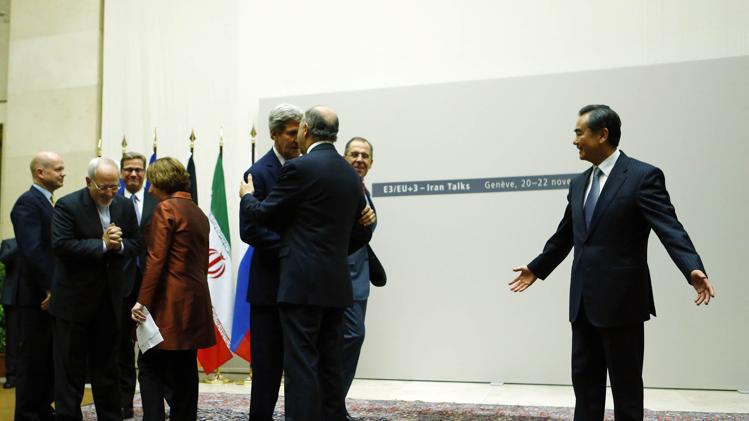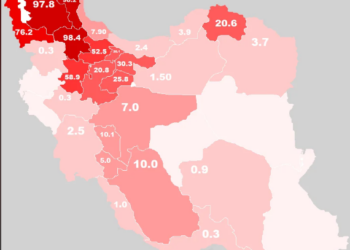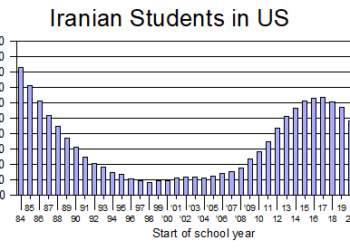November 29 2013

by Warren L. Nelson
The Big Six and Iran signed an agreement Sunday that will stop Iran from expanding its enrichment program but allow it to keep on enriching to less than 5 percent. The deal will also lift some sanctions, but won’t change the main sanctions on oil sales that are costing Iran more than $1 billion every week.
But this agreement is just an interim pact meant to apply only for six months while a “comprehensive” agreement is negotiated.
The interim agreement, however, says that the upcoming comprehensive agreement will allow Iran to continue enrichment, albeit within restricting parameters yet to be decided. So, Iran has won its key concern—that it be accorded the status of a nuclear enriching state.
The interim agreement also says the permanent agreement will end all sanctions imposed because of Iran’s nuclear program—but it won’t bar sanctions for human rights violations or other causes.
The interim agreement allows Iran some sanctions relief that the White House said would total $7 billion over six months, far less than Iran would lose from the continuing oil sanctions. But at least one critic said he calculated the benefit to Iran at about $20 billion. This is certainly a topic that will be watched closely over the next six months.
The agreement was instantly endorsed in Iran by Supreme Leader Ali Khamenehi. That should stifle most criticism. But it remains to be seen if it will stifle all criticism. Hardliners are expected to look for ways around Khamenehi that will allow them to assail the nuclear negotiators as bad Iranians—at least inept, if not outright traitorous.
In the United States, Secretary of State John Kerry began doing marathon batteries of interviews with television networks to defend the agreement. A key point in almost all of them was addressing concerns that the Islamic Republic cannot be trusted to carry out the deal.
“None of this is based on trust,” Kerry said in one such interview. “It’s a question of having the verification and the intrusive inspections.” Critics should compare the plan with the available alternatives, not some hypothetical ideal outcome, he said. “This negotiation is not the art of fantasy or the art of the ideal. It’s the art of the possible.”
The concession that Iran will be able to continue some enrichment is likely to be the main focus of critics in the West, since that is the main focus of the criticism by Israeli Prime Minister Binyamin Netanyahu.
However, some in the West think it is safer to allow some enrichment. “If enrichment is outlawed, every Iranian now working on enrichment will disappear,” one analyst said. “It’s better to keep some enrichment going so the IAEA [International Atomic Energy Agency] can keep its fingers on the operators.”
Those analysts argued that a continuing enrichment program would justify the presence of a lot of IAEA inspectors. It would be hard to justify their presence if Iran didn’t have any recognized enrichment program, one argued.
Others very critical of Iran said Iran’s nuclear program is a gigantic waste of money “so it’s in the West’s interest to keep it going, to keep it sucking money away from other programs.”
Commentator Reuel Marc Gerecht took a different tack, warning the interim deal most likely contained all that Iran was willing to concede.
“I think what has to be remembered is right now we’re at the high water mark of our leverage. I think in six months’ time, we’re going to discover we don’t have much at all,” he told CNN.
A combination of circumstances had come together to create “a window” for a deal, he said, pointing to Rohani’s surprise election, and the crippling sanctions on Iran which have left it running out of cash.
The deal does not require approval by the US Congress; the president has the authority to take all the actions required—including vetoing any new sanctions if Congress were to vote for them.
A senior Majlis deputy, Allayyar Malekshah, chair of the Justice Committee, said no Majlis approval is required, though a few deputies argued that all agreements made with a foreign country must be approved by the Majlis. Indeed, Articles 77 and 125 both require Majlis approval for all “international treaties, protocols, contracts and agreements.” It is very possible that Khamenehi ordered the Majlis to stay away from the agreement so as not to provide a forum for hardliners.
In Europe, the EU’s 28 foreign ministers must unanimously approve some of the changes contained in the agreement. They meet each month and are expected to approve the changes in December.
The negotiations were originally held in the UN’s Geneva Headquarters, the Palais des Nations. But they soon moved to the Intercontinental Hotel. As the negotiations dragged into Saturday night, the hotel was the venue for a huge charity ball. The Guardian of Britain reported that as the negotiators tried to fine-tune the wording of the agreement, the band music from the party became ever louder and penetrated into the negotiators’ rooms.
The Wall Street Journal said that after midnight the final text was sent back to the six nations’ capitals for final approval. At 2:30 a.m., the Iranian delgation said one change was needed. The Big Six said it was too late for changes—in other words, take it or leave it. Iran accepted the text and it isn ‘t known what last minute change it had wanted.
At 3 a.m., Sunday, Geneva time, that Michael Mann, the EU spokesperson at the talks, pressed the button on a draft tweet that went out: “We have reached agreement between E3+3 and Iran.”


















